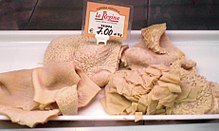Tripe eater

Tripe eater or tripe eater was the derogatory term for poor students or scholars since the late Middle Ages .
background
The poorer students ate their meals at so-called student open-air tables ( beneficium mensae communis ). They were therefore also named as beneficiaries. Free catering within the framework of such charitable foundations (beneficiaries, beneficiaries) was financed by monasteries, wealthy citizens or the university itself. The student table was often located in dormitories administered by the monastery, the so-called Konvikten , which is why the term tripe eater was also passed on to non-student residents of Konvikten. The meals consisted of the cheapest ingredients. The cheapest kind of meat was edible entrails , called tripe or tripe .
The expression tripe eater or tripe eater can also be found for high school students in church institutions. Graduates of the Berlin cadet institute , which was apparently run in a similarly ascetic manner, were given the same name in the 19th century, as "sour tripe" was a court that was often superior to them. In his travelogues about trips with James Cook , Georg Forster reports that the rural population of Madeira had a very meager diet, "However, they do not eat entrails or other meat waste because they call the most miserable beggars tripe-swallowers." Christian Wilhelm characterizes Kindleben in his student -Lexicon from 1781 the designation tripe eater as uncommon and writes: "Tripe eater, those students are named in some schools and universities who go to poor people because of their poverty and often have to put up with poor food."
Similar usage
Similar connotations were found with the expressions bellows or pänz for children, both of which allude to the stomach or pantex as in rumen .
swell
- Robert Paschke : Student History Lexicon (= GDS archive for university and student history. Supplement No. 9). SH-Verlag, Cologne 1997, ISBN 3-89498-072-9 , p. 147.
- Karl Friedrich Wilhelm Wander (Hrsg.): German Proverbs Lexicon. Volume 2, Leipzig 1870, column 1112 f. ( Digitized version ).
Individual evidence
- ^ Corvin: Cadettencorps in Berlin. Hausblätter, Stuttgart 1857, issue 1, p. 57ff and in From the life of a people's fighter - memories of Corvin. Amsterdam 1861, p. 133
- ^ Georg Forster: Voyage of discovery to Tahiti and the South Seas 1772–1775. edited by Hermann Homann, from Georg Forster's all writings, first and second volume. Leipzig 1843. Reprinted Edition Erdmann 1988, ISBN 3-522-60160-2 , 1st chapter
- ^ Christian Wilhelm Kindleben: Student Lexicon: named from the papers left behind by an unfortunate philosopher Florido. Hall / S. 1781, p. 116
- ↑ Plants
- ↑ The Latin Pantex is actually the origin of the Cologne word Panz. Word of the month at the Rhenish Institute for Regional Studies and Regional History
